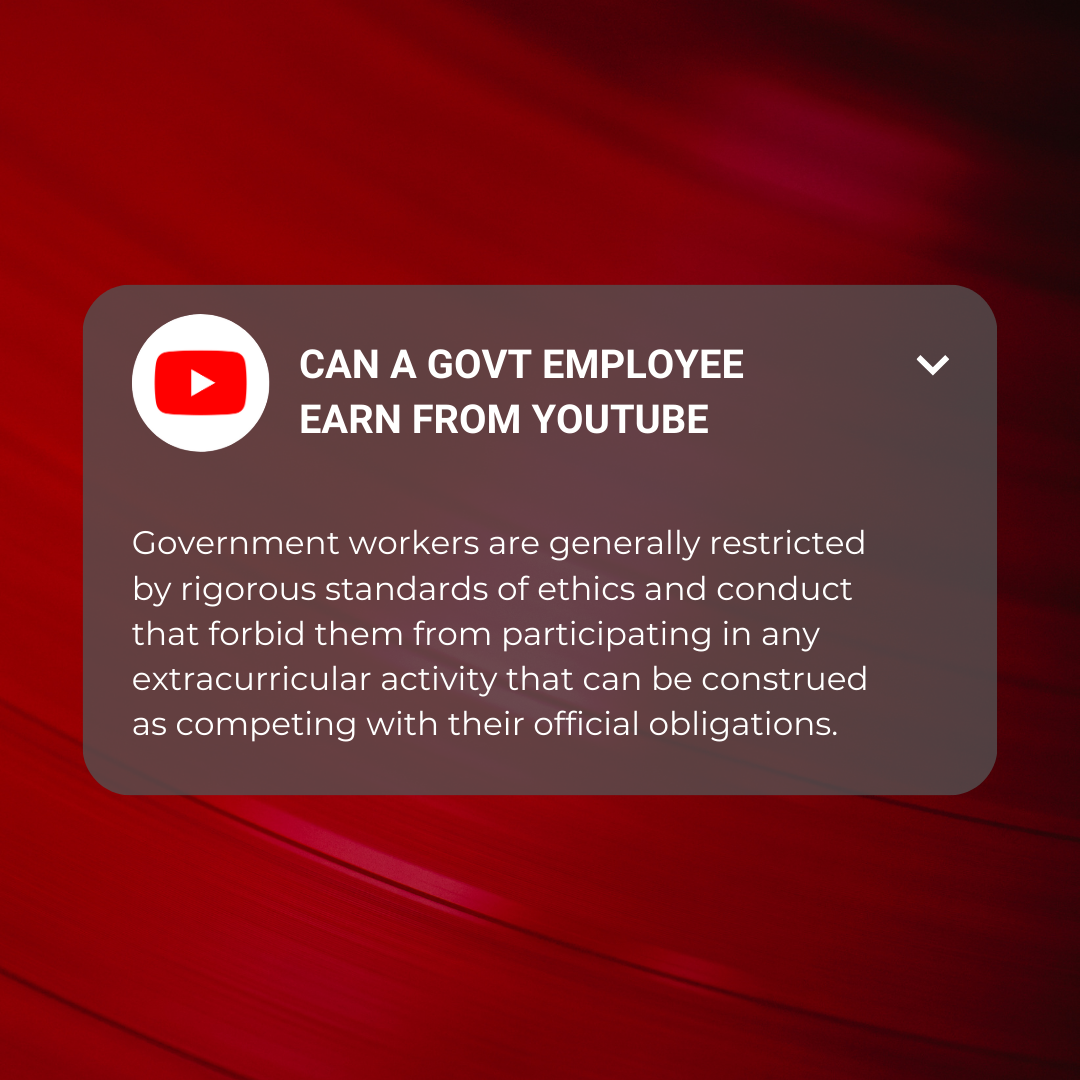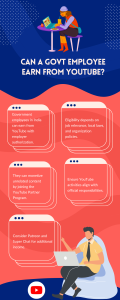Can a Govt Employee Earn from YouTube?

Under certain restrictions, a government worker in India may submit videos to YouTube and get money from them. Government workers must abide by several norms of conduct and regulations when seeking outside employment. Before working for anyone outside of their company, even making YouTube videos, they must first get authorization from their employer. Additionally, there are limitations on how government personnel can use their positions to promote any goods or services or for personal gain. So, Can a govt employee earn from YouTube? Let’s check!
The employee may upload videos to YouTube and make money from them, provided they do not contradict any of these rules or codes of behavior and have first received authorization from their company. Remembering that employees must adhere to all applicable tax laws and declare any money they receive from YouTube videos when filing their income tax returns is vital.
Before posting videos on YouTube, government employees must confirm they are not violating rules or regulations by consulting their employer’s code of conduct and other applicable laws.
Can a government worker get money by posting videos on YouTube?
YouTube has become a viral platform for content creators to display their talents and make money. Many people have used their YouTube accounts to successfully launch professions and generate sizable money. What about government workers, though? Can they make money on YouTube as well?
This question has a challenging solution. It depends on the laws and policies of the nation where the government employee works and those of the organization that hired them. Government workers are generally restricted by rigorous standards of ethics and conduct that forbid them from participating in any extracurricular activity that can be construed as competing with their official obligations. It implies that a government employee may be unable to monetize their YouTube channel if it is remotely connected to their line of work.
For instance, a government official who works for a body that regulates the food industry could not be permitted to make money from a YouTube channel that features restaurant reviews or cooking tutorials. A police officer might also not be allowed to make money from a medium that guides self-defense or firearms.
However, if the content has none to do with the area of work and doesn’t create conflicts of interest, they might be allowed to earn money from their YouTube channel. For instance, if a government worker develops a YouTube channel playing original songs or covers with a passion for music, they might be permitted to monetize it.
Before launching a YouTube channel or monetizing an existing one, government employees should consult their hiring organization and research their standards of conduct and ethics. If a government worker can commercialize their YouTube channel, the procedure is the same as for any other content producer. They must sign up for the YouTube Partner Program and meet the requirements, which include meeting the community guidelines and YouTube’s terms of service and accumulating a minimum of 4,000 watch hours and 1,000 subscribers over the previous 12 months.
Following acceptance into the program, participants can start making money from their YouTube channel through various revenue streams, including advertising, channel memberships, Super Chat and Super Stickers, product sales, and more. Investing time, effort, and attention are necessary to get a sizable revenue from YouTube. Content creators must continually provide top-notch material that appeals to and engages their audience. They also need to develop a devoted audience and advertise their channel.
Given their already demanding schedules, it might not be possible for government personnel to start and run a successful YouTube channel. However, earning money through YouTube may be a fulfilling side job for people passionate about video creation and prepared to put in the effort.

Government employees earn money from YouTube
Can government employees have YouTube channels?
Many young government workers are using social media as a platform to highlight their efforts. These brave young public workers have YouTube channels with zanily edited videos of their work, primarily those acting as district magistrates or in leadership positions in a district.
Is blogging permissible for government workers?
Yes, government workers can create a blog or a YouTube channel. Starting a blog or YouTube channel is entirely unrestricted.
Can a government employee profit from YouTube?
A government worker’s eligibility to make money from YouTube is determined by several factors, including their employer’s policies and the laws of their country. Government employees are prohibited from participating in extracurricular activities that clash with their official responsibilities in many nations’ codes of conduct and ethics. A government employee may not be permitted to monetize their YouTube channel if it is remotely connected to their line of work. However, they might be allowed to monetize their YouTube channel provided it is unrelated to their work and does not present a conflict of interest.
In that instance, individuals can enrol in the YouTube Partner Program and start earning money from the program’s numerous revenue streams. Before launching a YouTube channel or monetizing an existing one, it’s crucial for government personnel to research their codes of conduct and ethics and to consult their employing organization.
Are government employees’ YouTube channels permitted?
Government personnel with YouTube channels have yet to make any money from them. They may classify it as a pastime. Through Patreon and Super-chat during live streams, they can earn supplemental income from their subscribers and supporters. Charges may be undertaken towards you if you are a government employee in the first grade or higher.
Can we give a family member access to my YouTube channel?
Being a commercial activity (business), monetizing the YouTube channel will make it taxable. To evade the government’s response, the person can transfer ownership of the channel to his family, relatives, or friends. However, the government may take action against him if he frequently appears in YouTube videos.
Conclusion
The rules of the agency where a government employee works and the nature of their YouTube channel will determine whether they can make money from the site. They can make money through the various revenue streams provided by the YouTube Partner Program if permitted to monetize their channel. However, it is crucial for government workers to make sure that their YouTube activities do not interfere with their official responsibilities and to ask their employing organization for advice if necessary.
